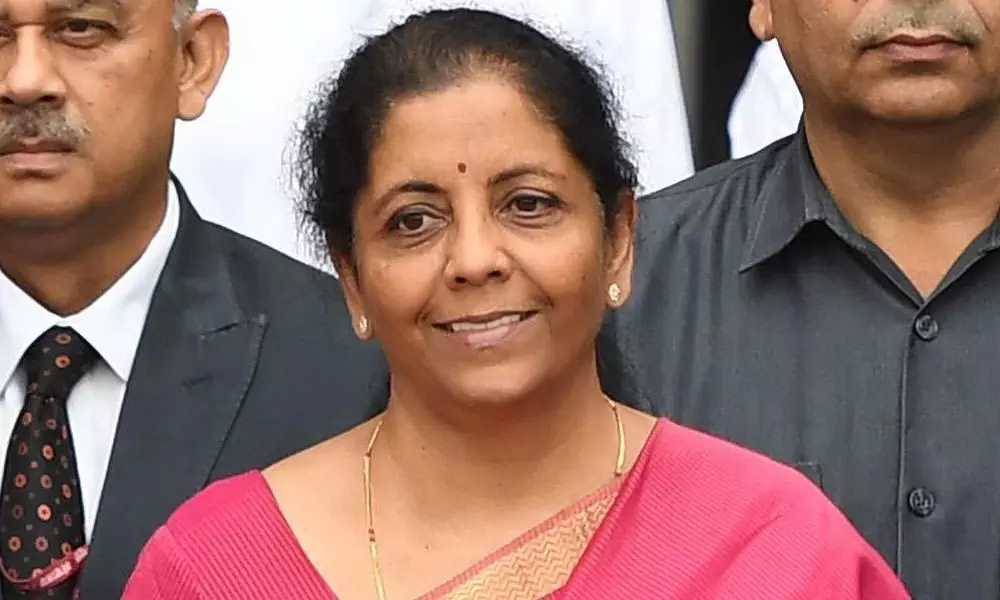Live
- India Faces Blow as Pacer Mohammed Shami Ruled Out for Remainder of Australia Series
- Farmer’s Day Celebrations Held at Palem Agricultural Research Center, Nagarkurnool
- Biden Pardon: Joe Biden Commutes Death Sentences of 37 Inmates, Including Child Killers and Mass Murderers
- South Korea: Yoon believes impeachment trial takes priority over martial law probe
- Strict Action for Non-Adherence to Time Management - DMHO Dr. Swarajya Lakshmi
- Joyful Semi-Christmas Celebrations at Sri Saraswathi International School
- Over 13.29 lakh houses approved for rural poor in Maharashtra: Shivraj Chouhan
- District Collector Urges Timely Completion of Indiramma Housing Scheme Survey
- Digital Arrest Scam: Hyderabad Man Duped of ₹7 Lakhs by Fake Crime Branch Police Callers
- Sukhbir Badal seeks President's Police medal for officer who saved his life
Just In

Finance Minister Nirmala Sitharaman will be presenting the Union Budget 2020-21 in the Parliament on February 1, 2020, in the backdrop of a slowing economy, joblessness and rising inflation.
Finance Minister Nirmala Sitharaman will be presenting the Union Budget 2020-21 in the Parliament on February 1, 2020, in the backdrop of a slowing economy, joblessness and rising inflation. Concern over India slipping into stagflation has taken centre stage.
Even the first advance estimates have put India's economic growth at 5 per cent for the current fiscal. But, the government has pinned hopes that the economy will turn the table in the second half after slipping to 4.5 per cent in the second quarter.
However, February 1, 2020, is the day that will give a chance to the finance minister Sitharaman to launch its salvos' against the stagnating/slowing economic growth, create jobs – just not limited to the speech but in a true sense – which in turn will give a boost to consumers demand. It is also an opportunity to see how she hunts down the trade deficit among the investors. The success of the salvos will definitely help India in turning a USD 5-trillion economy by 2024-25 a benchmark set by Prime Minister Narendra Modi.
Key Expectations from the Budget:
Demand from the Common Citizen: The common man is demanding a relaxation in personal income tax in line to a corporate rate tax cut that was announced in September 2019. They are also asking for creating job opportunities so that they can regain their spending power. It is expected that the Modi government may restructure the existing tax slabs and extend the exemption limit with an aim to put more money into pockets of the common man. There is a need to have control over the inflation that has grown tremendously in the third quarter.
Investors: Investors are demanding a steady and stable policy regime and relaxation. Share market investors are looking ahead for relaxation in long-term capital gains (LTCG) and Securities Transaction Tax (STT). STT is a direct tax that is paid by an investor against the value of taxable securities transactions done through a stock exchange. While LTCG is the tax that is charged on the profits earned on the sale of listed equity shares that are held for long term i.e. beyond 1 year.
Increase in Tax Breaks under Section 80C: Section 80C is a tool that is used mostly by almost every salaried taxpayer as it is a facility that allows him/her to save a bit from there hard-earned money. Thus, there is an expectation that the finance minister will increase the exemption level by including something new to the segment like exemptions in home insurance segment, which is yet not covered under the section. The expectation is also linked with the Modi government's first budget that was presented in 2014 when the exemption limit was raised from Rs1 lakh to 1.50 lakhs. This time, it is expected that the limit will be doubled, i.e. it will go up to Rs3 lakhs.
Dividend Distribution Tax (DDT): The corporate world seeks abolition of DDT, a tax that is paid by a company when it distributes the surplus profit to its shareholders. Currently, DDT stands at 20.56 per cent.
Real Estate Sector: Negative sentiment of the buyers has led to stagnation in demand in the real estate sector especially the residential segment. At such a crucial time, the real estate sector wants that the finance minister announces such schemes through the budget that demand is created. At the same time, the bodies and associations linked to the sector have placed their long wish-list in from the of the finance minister during their meet. They also expect that exemption on interest on the loans taken for affordable houses should be increased from Rs2 lakh to Rs3 lakh, which will definitely benefit the lower and mid-income category.
Automobile Sector: The automobile sector which has been under pressure in this fiscal since the first quarter year expects that certain schemes will be announced to benefit the sector. They also want the liquidity crunch situation faced by the NBFC sector should come to an end as availability of liquidity with NBFCs will allow people to go ahead with their plans of buying vehicles. They also want that the GST rates should be brought down from 28 per cent to 18 per cent and waiver of the registration charges on purchase of new vehicles. They also hope a formal incentive-based Scrappage Policy is announced that may spur the demand of the vehicles in the entire segment.

© 2024 Hyderabad Media House Limited/The Hans India. All rights reserved. Powered by hocalwire.com







